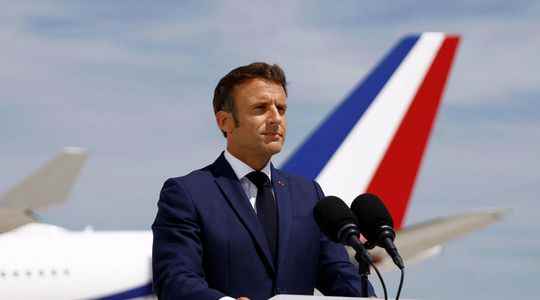The photo promises to be historic, this Thursday, June 16: the French president, in the company of the German and Italian prime ministers, in kyiv to support a country at war and its heroic president, Volodymyr Zelensky. Historical Europe gathered at the bedside of a martyred people, attacked by a dictatorial regime at the gates of the EU. “This visit remains very important, at least in terms of images, believes Ricardo Borges de Castro, deputy director of the European Policy Center. This is a major signal: despite the different approaches and sensitivities, Europe, wholeheartedly supports Ukraine unreservedly.”
For several weeks, rumors had predicted such a trip by Emmanuel Macron to kyiv: before the presidential campaign, between the two rounds, the day after his re-election, before the legislative elections… It will finally be before the second round of the legislative elections, on Sunday . “For the symbol, the French wanted to go to Ukraine alongside the Germans, but the latter were not necessarily welcome in kyiv because of their hesitation in the face of Russia, explains a German diplomat. The oil embargo Russia and new promises of arms deliveries are a game-changer.”
Weapons and a European future for Ukraine
Beyond the symbol, France, Germany and Italy bring concrete things to Ukraine, on the eve of major decisions for its European future. On Friday, the Commission will deliver its opinion on kyiv’s accession to the EU, and the Twenty-Seven will decide on June 23 whether or not to launch the integration process. “For a European head of state, going to Ukraine gives a certain allure, points out Sébastien Maillard, director of the Jacques Delors Institute. But you have to go there with a new message, either concerning Ukraine’s candidacy for the European Union, either concerning arms deliveries or new sanctions against Russia. The conditions must now be met.”
Faced with the expectations of other European countries, Paris has always insisted that Emmanuel Macron would go to Ukraine only at the request of Volodymyr Zelensky and with a specific objective. “The president has always said that he would go to Ukraine at the right time, and for him the right time will be the most useful to President Zelensky, underlined a diplomatic adviser to Emmanuel Macron before the formalization of the visit. We want be very clear in our support for Ukraine and therefore go there when the time comes. We must also ensure that the European Council sends a very clear signal to Ukraine, that our position is perfectly consistent and shared with the as many European partners as possible, in order to send a positive message of direct interest to Ukrainians.”
However, this trip comes very late in the calendar. The French, German and Italian leaders go to kyiv four months after the start of the Russian invasion, on February 24, and especially after delegations from all over Europe: Roberta Metsola, Ursula Von der Leyen, Charles Michel, Boris Johnson, Pedro Sanchez, the Poles, the Baltics, the Danes, the Finns… Even Justin Trudeau made the trip from Canada, and Jill Biden, the American First Lady, from Washington.
The weakened unity of Europeans
Macron, Scholz and Draghi were not conspicuous by their eagerness, and their absence in Ukraine did not go unnoticed. In recent weeks, a gap has widened between two Europes, particularly around the phrase of the French president believing that “we must not humiliate Russia”. The Baltics and the Poles see in these remarks a sign of submission to Vladimir Putin, when the Franco-German couple assures that a negotiation with the Kremlin remains essential to put an end to this war.
According to a study by the European Council of Foreign Relations published on June 15, the gap continues to grow between Europeans who favor “peace” in Ukraine, and those who give priority to “justice”. A visit to recall Europe’s common objective – to support Ukraine in its fight against Russia – was becoming urgent.
“So far, the unity of Europeans has surprised Putin, and Europeans themselves, but major problems are looming, underlines Mark Leonard, director of the European Council on Foreign Relations and co-author of the study. inflation, refugees and fear of nuclear escalation are all potentially divisive, but the Great Schism separates those who want to end the war as soon as possible and those who want to punish Russia. camp of peace’ and this ‘camp of justice’ if not managed properly, it could create as much damage as that between creditors and debtors during the euro crisis.”
A family photo in kyiv could be a good start for bringing Europe back together.
